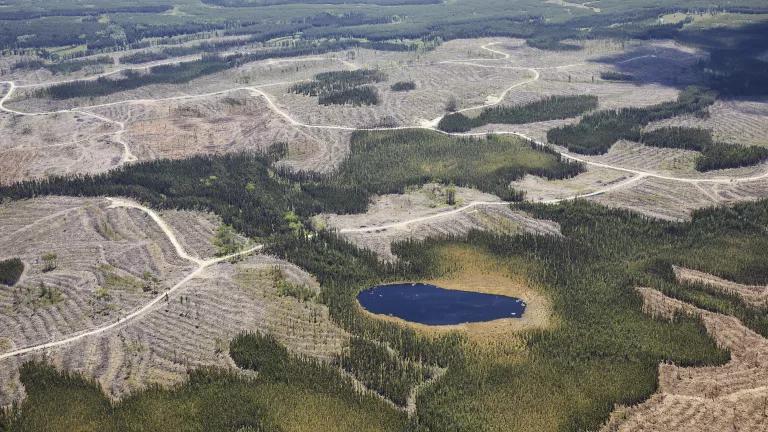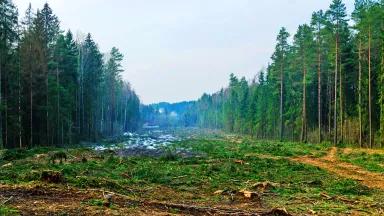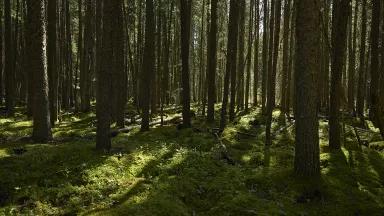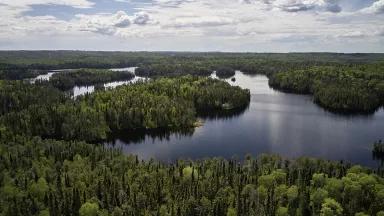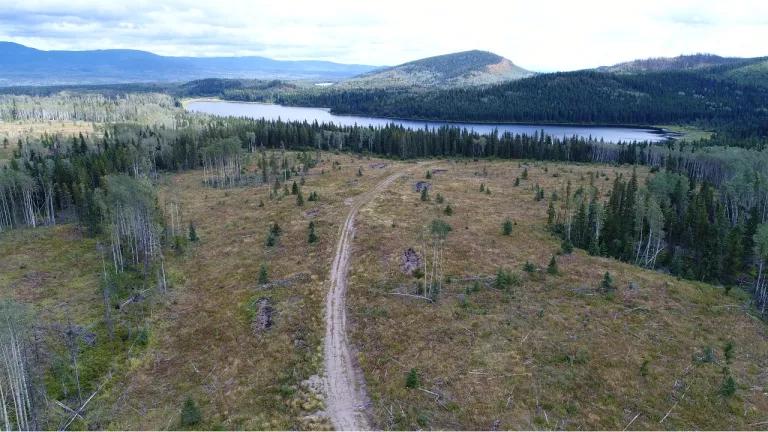Paper Excellence Expands Control into Canada’s Logging
With Paper Excellence’s planned purchase of one of Canada’s largest logging companies, the country's forestry industry is increasingly falling under the sway of the controversial Sinar Mas family empire.

A clearcut site in Ontario, Canada
Paper Excellence—Canada’s largest pulp producer with close links to the controversial Sinar Mas Group/Asia Pulp & Paper (Sinar Mas) corporate empire—is set to dramatically expand its influence over Canada's forests with the acquisition of one of the country's largest logging companies.
Within months, Paper Excellence is expected to absorb logging giant Resolute Forest Products, a company with some of the highest levels of wood sourcing from Canada’s boreal forest. This expansion comes on the heels of new evidence detailing the deep links between Paper Excellence and the Indonesian behemoth Sinar Mas, a conglomerate with well-documented ties to international deforestation, carbon emissions, and human rights abuses. The move cedes the future of much of Canada’s forests to a family empire connected to global deforestation and land grabbing.
A recent investigation has found compelling evidence indicating that Sinar Mas, in effect, controls Paper Excellence. Paper Excellence, since its acquisition of pulp producer Domtar in 2021, has become one of the world’s largest producers of market pulp, much of which it exports to Asia. Based in Jakarta, Sinar Mas is one of the globe’s largest consumers of NBSK pulp; it uses pulp to make single-use products including tissue paper. Both Sinar Mas and Paper Excellence are owned by members of the mega-wealthy Widjaja family.
Sinar Mas and Paper Excellence maintain that they are separate entities, but a large number of environmental groups have determined that the new evidence and past reports suggest that the two groups operate like a conglomerate. The findings have raised significant concerns that the interrelated nature of these corporations risks expanding the controversial Sinar Mas empire, as well as reducing transparency and accountability around Canada’s own logging.
If Paper Excellence follows the same path with the proposed Resolute acquisition as it did with its Domtar acquisition, it would reduce public insight into Resolute’s activities by making the company privately held and removing shareholder influence. Resolute ranks among the Canadian logging industry’s most egregious environmental offenders, with high levels of sourcing from forests containing threatened species habitat. It also manages more forest areas under the Sustainable Forestry Initiative—an industry-created scheme widely criticized as a greenwashing mechanism—than any other company.
Resolute is one of the world’s largest lumber producers, with a production capacity of almost three billion board feet per year; more than 20 million hectares of forest under management (an area more than six times the size of Vancouver Island); and a history of suing and intimidating critics of its operations. Acquiring Domtar may have cemented Paper Excellence as Canada’s pulp king, but absorbing Resolute would also make it one of the most powerful logging companies on the continent. Such power should require more public scrutiny of Paper Excellence’s logging activities, not less.
If Canada’s logging companies are increasingly to be owned by multinational corporations with hidden corporate structures, this creates renewed urgency for Canada’s federal and provincial governments to enact meaningful sustainability and Indigenous rights safeguards, including Indigenous-led protected and conserved areas and protections for irreplaceable primary forests. Instead, provincial policymakers are restricting the public’s ability to influence forest policy, while the federal government advances discredited narratives that its forests are well-protected, sustainably logged, and even that the industrial logging of primary forests helps solve the climate crisis.
The federal government states that 94 percent of its forests are publicly owned. It also asserts its commitment to empowering Indigenous Peoples—who have stewarded these forests for millennia—to protect their traditional territories. Yet the rights to clearcut these forests are being sold to international private interests with deep connections to deforestation and human rights violations. And the complacency of Canada’s federal and provincial governments risks helping enormous multinational corporations greenwash logging operations spanning the entire globe.
Industrial logging is destroying a million acres of the boreal every year.
Tell Justin Trudeau to close Canada's logging loopholes and save the boreal forest!
